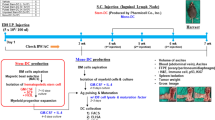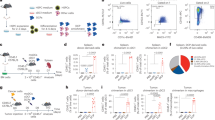Abstract
Our previous study showed that J558 myeloma cells engineered CD40L lost their tumorigenicity in syngeneic mice, and the inoculation of J558/CD40L tumor cells further led to the protective immunity against wild tumors. In the present study, we investigated whether the vaccine can exert more efficient antitumor immunity by combination with adenovirus mediated CD40L gene therapy and immature dendritic cells (iDCs). The results demonstrated that intratumoral administration of iDCs 2 days after AdVCD40L injection, not only significantly suppressed the tumor growth, but also eradiated the established tumors in 40% of the mice. The potent antitumor effect produced by the combination therapy correlated with high expression of MHC, costimulatory and Fas molecules on J558 cells, which was derived from CD40L transgene expression. In addition, transgene CD40L expression could dramatically induce J558 cell apoptosis. Effectively capturing apoptotic bodies by iDCs in vivo could induce DC maturation, prime tumor-specific CTLs and tend to Th1-type immune response. Finally, in vivo depletion experimentation suggested both CD4+ and CD8+ T cells were involved in mediating the antitumor immune responses of combined treatment of AdVCD40L and iDCs, with CD8+ T cells being the major effector. These findings could be beneficial for designing strategies of DCs vaccine and CD40L for anticancer immunotherapy.
This is a preview of subscription content, access via your institution
Access options
Subscribe to this journal
Receive 12 print issues and online access
$259.00 per year
only $21.58 per issue
Buy this article
- Purchase on Springer Link
- Instant access to full article PDF
Prices may be subject to local taxes which are calculated during checkout









Similar content being viewed by others
References
Steinman RM, Bancherear J . Dendritic cells and the control of immunity. Nature. 1998;392:245–252.
Cella M, Sallusto F, Lanzavecchia A . Origin, maturation and antigen presenting function of dendritic cells. Curr Opin Immunol. 1997;9:10–16.
Nestle F, Alijagic S, Gilliet M, et al. Vaccination of melanoma patients with peptide- or tumor lysate-pulsed dendritic cells. Nat Med. 1998;4:328–332.
Nair S, Snyder D, Rouse B, et al. Regression of tumors in mice vaccinated with professional antigen-presenting cells pulsed with tumor extracts. Int J Cancer. 1997;70:706–715.
Bancherau J, Steinman RM . Dendritic cells and the control of immunity. Nature. 1998;392:245–252.
Hart DN . Dendritic cells: unique leukocytes populations which control the primary immune response. Blood. 1997;90:3245–3287.
Shreedhar V, Moodycliffe AM, Ullrich SE, et al. Dendritic cells require T cells for functional maturation in vivo. Immunity. 1999;11:625–636.
Schoenberger SP, Toes RE, van der Voort EI, et al. T-cell help for cytotoxic T lymphocytes is mediated by CD40-CD40L interactions. Nature. 1998;393:480.
Hermans IF, Ritchie DS, Daish A, et al. Impaired ability of MHC class II−/− dendritic cells to provide tumor protection is rescued by CD40 ligation. J Immunol. 1999;163:77–81.
Moodycliffe AM, Shreedhar V, Ullrich SE, et al. CD40–CD40 ligand interactions in vivo regulate migration of antigen-bearing dendritic cells from the skin to draining lymph nodes. J Exp Med. 2000;191:2011–2020.
Kurts C, Heath WR, Carbone FR, et al. Constitutive class I-restricted exogenous presentation of self antigens in vivo. J Exp Med. 1996;184:923.
Larsson M, Messmer D, Somersan S, et al. Requirement of mature dendritic cells for efficient activation of influenza A-specific memory CD8+ T cells. J Immunol. 2000;165:1182–1190.
Schuurhuis DH, Laban S, Toes RE, et al. Immature dendritic cells acquire CD8+ cytotoxic T lymphocyte priming capacity upon activation by T helper cell-independent or -dependent stimuli. J Exp Med. 2000;192:145–150.
Kelleher M, Beverley PC . Lipopolysaccharide modulation of dendritic cells is insufficient to mature dendritic cells to generate CTLs from naive polyclonal CD8+ T cells in vitro, whereas CD40 ligation is essential. J Immunol. 2001;167:6247–6255.
Watanabe S, Kagamu H, Yoshizawa H, et al. The duration of signaling through CD40 directs biological ability of dendritic cells to induce antitumor immunity. J Immunol. 2003;171:5828–5836.
Miyashita T, McIlraith MJ, Grammer AC, et al. Bidirectional regulation of human B cell responses by CD40–CD40 ligand interactions. J Immunol. 1997;158:4620–4633.
Young LS, Eliopoulos AG, Gallagher NJ, et al. CD40 and epithelial cells: across the great divide. Immunol Today. 1998;19:502–506.
Pellat-Deceunynck C, Bataille R, Robillard N, et al. Expression of CD28 and CD40 in human myeloma cells: a comparative study with normal plasma cells. Blood. 1994;84:2597–2603.
Tong AW, Seamour B, Chen J, et al. CD40 ligand-induced apoptosis is Fas-independent in human multiple myeloma cells. Leukemia Lymphoma. 2000;36:543–558.
Teoh G, Ai YT, Urashima M, et al. CD40 activation mediates p53-dependent cell cycle regulation in human multiple myeloma cell lines. Blood. 2000;95:1039–1046.
Bergamo A, Bataille R, Pellat-Deceunynck C . CD40 and CD95 induce programmed cell death in the human myeloma cell line XG2. Br J Haematol. 1997;97:652–655.
Liu Y, Qureshi M, Xiang J . Antitumor immune responses derived from transgenic expression of CD40 ligand in myeloma cells. Cancer Biother Radiopharm. 2002;17:11–18.
Wright P, Braun R, Babiuk L, et al. Adenovirus-mediated TNF-α gene transfer induces significant tumor regression in mice. Cancer Biother Radiopharm. 1999;14:49–57.
Xiang J, Moyana T . Regression of engineered tumor cells secreting cytokines is related to a shift in host cytokine profile from type 2 to type 1. J Interferon Cytokine Res. 2000;20:349–354.
Song W, Kong H, Carpenter H, et al. Dendritic cells genetically modified with adenovirus vector encoding the cDNA for a model antigen induce protective and therapeutic antitumor immunity. J Exp Med. 1997;186:1247–1256.
Dotti G, Savoldo B, Takahashi S, et al. Adenovector-induced expression of human-CD40-ligand (hCD40L) by multiple myeloma cells: a model for immunotherapy. Exp Hematol. 2001;29:952–961.
Albert ML, Pearce SFA, Francisco LM, et al. Immature dendritic cells phagocytose apoptotic cells via βαvβ5 and CD36, and cross-present antigens to cytotoxic T lymphocytes. J Exp Med. 1998;188:1359–1368.
Grossmann M, Brown M, Bresnner M . Antitumor responses induced by transgenic expression of CD40 ligand. Hum Gene Ther. 1997;8:1935–1943.
Tong AW, Stone MJ . Prospects for CD40-directed experimental therapy of human cancer. Cancer Gene Ther. 2003;10:1–13.
Van Kooten C, Bancherau J . Functions of CD40 on B cells, dendritic cells and other cells. Curr Opin Immunol. 1997;9:330–337.
Schultze JL, Michalak S, Seamon MJ, et al. CD40-activated human B cells: an alternative source of highly efficient antigen presenting cells to generate autologous antigen-specific T cells for adoptive immunotherapy. J Clin Investig. 1997;100:2757–2765.
Schultze JL, Seamon MJ, Michalak S, et al. Autologous tumor infiltrating T cells cytotoxic for follicular lymphoma cells can be expanded in vitro. Blood. 1997;89:3806–3816.
Cantwell MJ, Wierda WG, Lossos IS, et al. T cell activation following infection of primary follicle center lymphoma B cells with adenovirus encoding CD154. Leukemia. 2001;15:1451–1457.
Albert ML, Sauter B, Bhardwaj N . Dendritic cells acquire antigen from apoptotic cells and induce class I-restricted CTLs. Nature. 1998;392:86–89.
Hoffmann TK, Meidenbauer N, Whiteside DG . Generation of tumor-specific T lymphocytes by cross-priming with human dendritic cells ingesting apoptotic tumor cells. Cancer Res.. 2000;60:3542–3549.
Sotomayor EM, Borrello I, Tubb E, et al. Conversion of tumor-specific CD4+ T-cell tolerance to T-cell priming through in vivo ligation of CD40. Nat Med. 1999;5:780–787.
Acknowledgements
This work was supported by a Research Grant (ROP-15151) of the Canadian Institute of Health Research. Yongqing Liu is supported by a Fellowship Award of the Leukemia Research Fund of Canada.
Author information
Authors and Affiliations
Corresponding author
Rights and permissions
About this article
Cite this article
Liu, Y., Xia, D., Li, F. et al. Intratumoral administration of immature dendritic cells following the adenovirus vector encoding CD40 ligand elicits significant regression of established myeloma. Cancer Gene Ther 12, 122–132 (2005). https://doi.org/10.1038/sj.cgt.7700757
Received:
Published:
Issue Date:
DOI: https://doi.org/10.1038/sj.cgt.7700757
Keywords
This article is cited by
-
Programming CAR T cells to enhance anti-tumor efficacy through remodeling of the immune system
Frontiers of Medicine (2020)
-
A novel agent SL-401 induces anti-myeloma activity by targeting plasmacytoid dendritic cells, osteoclastogenesis and cancer stem-like cells
Leukemia (2017)
-
CD40 ligand induced cytotoxicity in carcinoma cells is enhanced by inhibition of metalloproteinase cleavage and delivery via a conditionally-replicating adenovirus
Molecular Cancer (2010)
-
Transgene expression of α tumor necrosis factor with mutations D142N and A144R under control of human telomerase reverse transcriptase promoter eradicates well-established tumors and induces long-term antitumor immunity
Cancer Gene Therapy (2009)
-
Vaccination of fiber-modified adenovirus-transfected dendritic cells to express HER-2/neu stimulates efficient HER-2/neu-specific humoral and CTL responses and reduces breast carcinogenesis in transgenic mice
Cancer Gene Therapy (2008)



